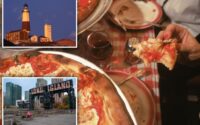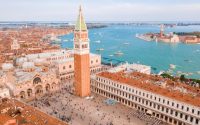I’m a nutritionist — never eat these 5 foods before flying
It’s time to jettison these foods before takeoff.
What you consume affects your energy levels as you try to align your body with the time zone you’ve landed in. Some compounds are digested differently in higher elevations, meaning that the foods you eat before or during a flight should be chosen with extra care.
To help narrow down your options, nutrition expert Ryan Davidson of cleanse company Raw Juicery is sharing the five foods and drinks travelers should avoid before boarding their next flight.
Coffee
Take a look at the Starbucks line in any airport, and you’ll see weary travelers relying on a cup of joe to jolt them awake as they make their way to their destination.
However, bringing your venti pumpkin spice latte onto your flight might not be the best choice.
“Coffee is dehydrating and acts as a mild diuretic, meaning you’ll likely have to make several trips to the bathroom during your flight, which is an inconvenience to yourself and other passengers,” Davidson told The Post.
He warns that coffee drinkers should avoid the caffeinated beverage for up to two hours before buckling into their seats.
Alcohol
Some flyers like to order a stiff drink to calm their nerves or a glass of bubbly to start their vacation early, but Davidson actually advises against drinking alcohol before a flight.
“Your body doesn’t process alcohol as effectively in the air because of the cabin pressure and decreased blood oxygen levels,” he explained.
“This means that you will feel the effects of alcohol and experience dehydration symptoms much more quickly. This could lead to you missing your connecting flights, being rejected by the car rental company on the ground, or even getting arrested for unruly behavior during the flight.”
Tap water
Water is likely the best choice to quench your thirst while en route, though Davidson advises travelers to opt for bottled water rather than refilling from the tap on the plane.
“Airlines have strict regulations and run water tests on their aircrafts regularly, but it doesn’t mean that contamination can’t occur. Water is stored in tanks on the plane and can be picked up from many points on a route where contamination can take place,” he reasoned.
“Your safest option when flying is to drink bottled water and stay away from any liquids that could come from a storage tank. This could be anything such as hot chocolates, teas, and coffees. Contaminated water can cause a variety of symptoms including diarrhea, vomiting, and even respiratory conditions.”
Apples
Although most people would think that biting into an apple before a flight would be a healthy choice, Davidson revealed that the excess fructose and high fiber content may cause gas and bloating.
“As a snack, apples are a great choice. They’re a fruit that supports brain and heart health and should be a part of a balanced diet. But in the 24 hours leading up to a flight, you’ll want to avoid them, as the 4-5 grams of fiber per serving can lead to a bloated stomach when flying,” he said.
Chewing gum
Smacking on a piece of gum is a common remedy to help flyers manage cabin pressure and pop their ears, but Davidson warns that there may be unwanted side effects.
“The pressurization of the cabin means that we are already at more risk of passing gas in the plane,” he noted.
“Chewing gum can increase the risk of bloating and extra gas as you open your mouth when chewing and swallow more air. The artificial sweeteners in gum can also increase your chances of excess gas too.”


